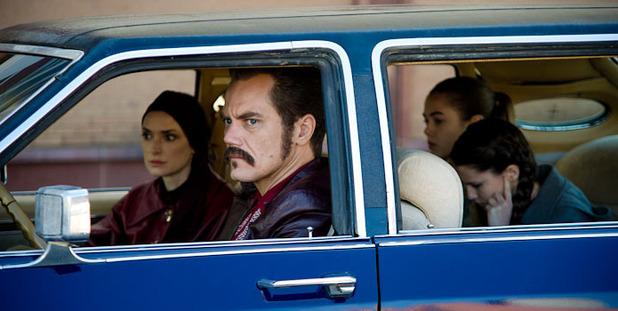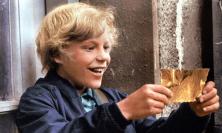Director: Ariel Vromen
Starring: Michael Shannon, Winona Ryder, Chris Evans
UK Release date: 7 June 2013
Certificate: 15 (105 mins)
This biopic chronicles the life and lies of a sociopath sustaining a double existence as a remorseless killer and a devoted family man. Based on the documentary The Iceman Tapes: Conversations with a Killer, the film follows hitman Richard Kuklinski (Michael Shannon), a Catholic Polish-American, who murdered more than 100 people before his arrest in 1986. To say that The Iceman is a study of one man’s inner demons and better angels would be far too charitable towards a main character who repetitively denied his own humanity, as well as that of many others, over the course of three decades. Denial is a key theme throughout; however, the film’s juxtaposition of tenderness and violence and its ability to engage the audience with Kuklinski’s struggle for morality provide Shannon with enough space to turn in a performance which both repulses and elicits empathy.
Kuklinski’s duality is evident even in the film’s opening scenes. He sits in a coffee shop in Jersey City in 1964 with Deborah Pellicotti (Winona Ryder), his future wife, making shy but sweet attempts at small talk. He describes Deborah as ‘a prettier version of Natalie Wood’, which helps her warm to his awkward charm, and on being asked what he does for a living he declares that he dubs ‘cartoons for Disney’; his favourite is Cinderella. We later discover that this is the first of his many lies to Deborah, as we witness him working deep into the night, bootlegging pornographic movies. The following scene, set in a bar, appears to show Kuklinski displaying restraint in the face of a man bad-mouthing Deborah. However, we are left in no doubt about his true character as he calmly cuts the man’s throat in a dark alleyway later.
Through his dubious work connections, Kuklinski becomes acquainted with Roy Demeo (Ray Liotta), a small time gangster who admires Kuklinski’s ability to remain calm under pressure. When Richard asks about a job, Demeo tests his loyalty by asking him to kill a homeless man, which he does with quiet aplomb. As the money starts rolling in from his new job, his family grows with the birth of his two daughters. The Kuklinskis buy a new house and Richard tells Deborah and his friends that the family’s obvious wealth has come about thanks to a new job in finance.
However, the volatile and violent world of gangs cannot provide stability for long, and when one of Demeo’s foot soldiers, Josh Rosenthal (David Schwimmer), angers a rival gang by stealing drugs and murdering two of their own, the operation has to lay low for a while and Kuklinski is out of a job. With a family oblivious to the truth, maintenance of the lie is paramount and he teams up with another freelance killer, Robert Pronge (Chris Evans), whose preferred method of dispatch is the use of cyanide spray. When a contract comes in to kill one of Demeo’s other bodyguards, Kuklinski takes it to ensure the bills are paid, but the hit raises Demeo’s awareness that his recruit is back in the game and so the net starts to close in on him and his family.
The denial of life, of the truth and of one’s own humanity are all highlighted in two key scenes, which also bring to light Kuklinski’s denial of God and his bewildering ethical relativism. In the first, he is deployed to hunt down Rosenthal at his flat after the robbery. Rosenthal is not there but he comes across his friend, Marty Freeman (James Franco), and is ordered by Demeo to kill him so as to leave no witnesses. Freeman begins to pray before being executed and Kuklinski looks on, half interested in whether God will intervene and half despising the thought that Freeman is asking God to deliver him. Losing his patience, Kuklinski shoots Freeman and concludes that God must be too busy to answer his plight. His God is a distant and disinterested deity who does not concern himself with the problems of this world and has ‘nothing to do’ with the atrocities that take place within creation. The second scene occurs about an hour into the film when we are given a very fleeting look into his past. Kuklinski secretly visits his brother, Joey (Stephen Dorff), who is inside for killing a 12-year-old girl in a botched crime. Kuklinski looks down upon Joey for murdering this young girl as he draws an ethical line in the sand at killing women and children. But when Joey questions his brother’s charade as a family man, Kuklinski denies his brother and walks away. His loveless theology is as cold as his ability to dispatch his hits and leaves little room for forgiveness or redemption, even for his only brother.
Similarly, by choosing to deny Deborah the truth, Kuklinski condemns himself to supporting his family in a purely mechanical way. While he earns money, he is unable to reveal anything of himself, his professional life or his personal struggles. Because of this, he denies himself full communion with the few people that he loves. The closest we come to any kind of confession is in the final scene where Kuklinski is shown in prison, heavily bearded and serving two life sentences with no hope of release. He is taking questions from an unseen interviewer and asked if he has any regrets about his life. His immediate response is to deny this as well, but in the same breath he admits that his actions have been ‘wrong’. After a moment of reflection he admits that he would only ever want forgiveness from his family but realises that he has so distanced himself from them that he has condemned himself to a hell of his own making.
Adam Berry
![]() Visit this film's official web site
Visit this film's official web site






